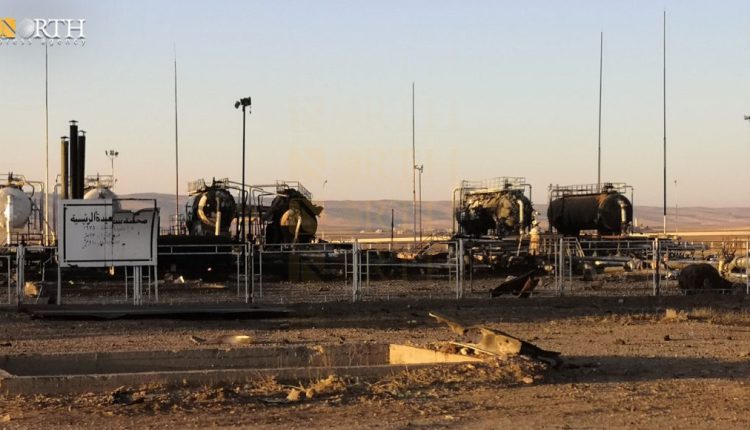
QAMISHLI, Syria (North Press) – The recent escalation of Turkish military actions in Northeast Syria resulted in significant humanitarian concerns, with over 1,000 attacks targeting critical infrastructure and leading to numerous casualties.
The Turkish bombardment has affected various areas, starting from the northern countryside of Aleppo, passing through Manbij and Kobani in northern Syria, and extending to Tel Tamr, Derbasiyah, Amuda, Qamishli, and Tirbe Spiyeh (al-Qahtaniya), all the way to Derik (al-Malikiyah) in the far northeast.
Casualties
The Autonomous Administration of North and East Syria (AANES) revealed in an official statement read in front of its headquarters in the city of Raqqa in northern Syria, that Turkey has conducted 1,031 attacks, resulting in 17 killings and 65 injuries. These attacks included 118 drone strikes, 20 air raids, and 893 mortar and artillery shelling.
The Turkish bombardment has knocked out power stations supplying electricity to cities and areas such as Qamishli, Kobani, Amuda, and Derbasiyah, causing power outages for over 150,000 families, in addition to disrupting water supplies.
The Internal Security Forces of North and East Syria (Asayish) said that three members of their forces were killed in the airstrikes. One Asayish member was killed in Kobani and two in the northern countryside of Aleppo.
Among the casualties was 24-year-old Hussein Ali D’Ass, who was killed while working at the silos south of Kobani.
The victims who were killed in the northern Aleppo include, 5-year-old Malak Shiyar, her mother Kurdistan Khalil Waqas (32), Ibrahim Muhammad Sheikho (55), and Muhammad Waqfi Muhammad (47).
In the Sweidiya gas plant near Derik, eight workers were killed, including 28-year-old Mizer Al-Hassan, 32-year-old Issam al-Sibaih, 48-year-old Attallah al-Khedr, 17-year-old Bashar al-Owaid, 29-year-old Mahmoud al-Hussein, and Mahmoud al-Hussein, 29, Fadel al-Khadaan (age unknown), and Elias Issa, 31, and another who has not been identified yet.
In Manbij, a Turkish strike resulted in the killing of 11-year-old Farah al-Barho and injured her two brothers, 13-year-old Abdurrahman and 8-year-old Samir.
Timeline of attacks
On the first day, Turkish forces targeted the center of Kobani, the vicinity of Tel Rifaat, the countryside of Manbij in northern Aleppo, villages in the countryside of Tel Abyad in northern Raqqa, and the countryside of Derik, as well as oil stations and the outskirts of Qamishli.
These attacks resulted in 12 fatalities, including a child, and injured 25 others, leading to the shutdown of the Kobani power station.
On the second day, the Turkish forces targeted Kobani again, five locations in Rmelan, a power station in Amuda, the Sweidiya gas plant, and multiple areas in Kobani and Qamishli.
Seven workers at the Sweidiya gas plant near Derik were killed that day, and the Asayish announced the death of one of their members, Hanoush Baki, in Kobani.
On the third day, Turkish forces targeted cities and towns including Manbij, Qamishli, Girke Lege (Maabadeh), Tirbe Spiyeh, the Awda oil field, Saeeda oil field, the Agricultural Development Company in Qamishli, and Rufi silos in Kobani.
Strikes in Kobani included the he Euphrates Wedding Hall, an Asayish checkpoint, Kobani mill, Kobani stadium, and al-Amal Hospital.
Several consecutive strikes hit a car repair workshop and surrounding factories in Rmelan, while the village of Umm al-Keif in the Tel Tamr countryside was also shelled.
On the fourth day, attacks targeted cities and towns in Qamishli, Derik, Manbij and its countryside, an Asayish headquarters in Amuda, the village of Ger Zero, Ain Issa, and five villages in Afrin and Tel Rifaat in northern Aleppo.
These attacks resulted in injuries to three children in Manbij, four women in Derik, and eight injured individuals in Amuda.
Deepening of crises
Turkey carried out over a thousand attacks on northern Syria, which jeopardizes the safety of facilities housing members of the Islamic State (ISIS) and threatens the lives of millions of residents, the AANES’ statement read.
The AANES condemned the “unprovoked attacks,” asserting that they aim to exacerbate existing economic crises by targeting vital infrastructure and essential services.
This escalation threatens the well-being of approximately five million people, including both indigenous residents and displaced individuals living in the AANES areas, according to the statement.
The AANES highlighted that such aggression poses a significant risk to humanitarian, social, and service conditions, creating an environment conducive for terrorist cells to strengthen their presence and prepare for further attacks.
The AANES urged Global Coalition forces, Russia, and all human rights and humanitarian organizations to acknowledge the implications of these aggressive actions, take measures to halt them, and establish investigative committees to hold those responsible accountable.
